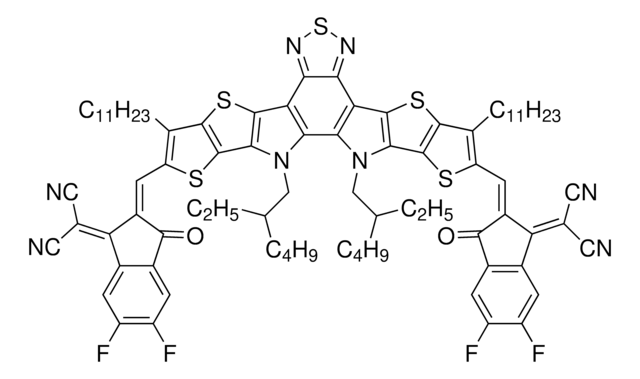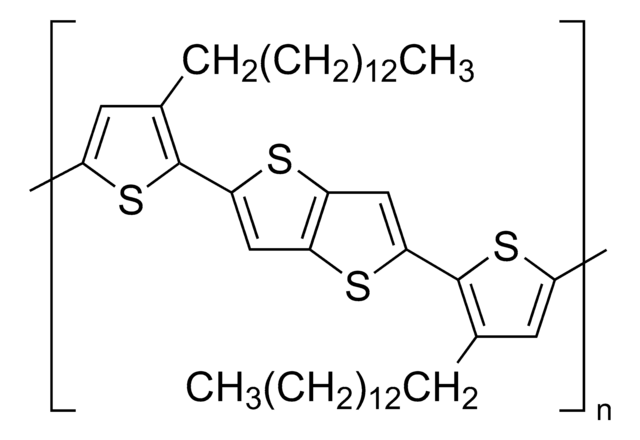510823
Poly(3-hexylthiophene-2,5-diyl)
regiorandom
Synonym(s):
P3HT
About This Item
Recommended Products
Quality Level
color
red
mp
238 °C
solubility
chloroform, methylene chloride, toluene, and THF: soluble
fluorescence
λex 420 nm; λem 551 nm in chloroform
OPV Device Performance
ITO/NiO/P3HT/PC61BM/LiF/Al
ITO/PEDOT:PSS/P3HT:PC61BM (1:08)/Al
Related Categories
General description
Application
Packaging
Legal Information
Rieke is a registered trademark of Rieke Metals, Inc.
Signal Word
Warning
Hazard Statements
Precautionary Statements
Hazard Classifications
Eye Irrit. 2 - Skin Irrit. 2 - STOT SE 3
Target Organs
Respiratory system
Storage Class Code
11 - Combustible Solids
WGK
WGK 3
Flash Point(F)
Not applicable
Flash Point(C)
Not applicable
Personal Protective Equipment
Regulatory Listings
Regulatory Listings are mainly provided for chemical products. Only limited information can be provided here for non-chemical products. No entry means none of the components are listed. It is the user’s obligation to ensure the safe and legal use of the product.
JAN Code
510823-VAR:
510823-1G:
510823-BULK:
Choose from one of the most recent versions:
Already Own This Product?
Find documentation for the products that you have recently purchased in the Document Library.
Customers Also Viewed
Articles
PCBM-based n-type semiconductors - Find p- and n-type organic semiconductors available with PCBM library & properties.
The application of conducting polymers at the interface with biology is an exciting new trend in organic electronics research.
Novel Graphene‑Based Nanostructures Production, Functionalization, and Engineering
Intrinsically stretchable active layers for organic field-effect transistors (OFET) are discussed. Polymer structural modification & post-polymerization modifications are 2 methods to achieve this.
Our team of scientists has experience in all areas of research including Life Science, Material Science, Chemical Synthesis, Chromatography, Analytical and many others.
Contact Technical Service

![[6,6]-Phenyl C61 butyric acid methyl ester ≥99%](/deepweb/assets/sigmaaldrich/product/structures/359/221/d990c746-0960-4c69-bf76-fe09b193824d/640/d990c746-0960-4c69-bf76-fe09b193824d.png)

![[6,6]-Phenyl C71 butyric acid methyl ester, mixture of isomers 99%](/deepweb/assets/sigmaaldrich/product/structures/716/624/9fb9f2f0-ae99-429f-8d3a-b12267976a4d/640/9fb9f2f0-ae99-429f-8d3a-b12267976a4d.png)



